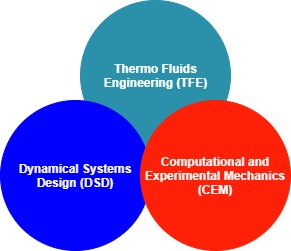All mechanical engineering devices are made of materials, which must be strong and stiff enough, operate in an environment where transport of matter and heat flow are of crucial importance, and must be controlled to carry out user-specified functions. The department of Mechanical Engineering is built around three divisions which are designed to reflect the department's long-term fundamental research themes. In each of these divisions the aim is to integrate fundamentals, design and manufacturing.

Computational and Experimental Mechanics (CEM)
All engineering structures and devices are made of materials and must sustain mechanical and environmental influences. The sections in this division work on the analysis, processing and development of materials in the widest possible sense. The following sections constitute the 'Materials & Mechanics' division:
Dynamical Systems Design (DSD)
Many components together form systems, which must function according to requirements and demands of users. A proper control at various levels is therefore essential, as is their proper assembly. The following sections constitute the 'Systems, Dynamics and Control' division:
Thermo Fluids Engineering (TFE)
Flow and transport of heat and matter are the core of this cluster, with energy as a most important application domain of crucial societal importance. The following sections constitute the 'Energy and Flow' division: